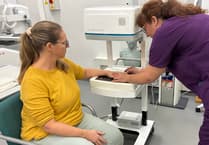TESTING is continuing at Dartmoor Prison after high levels of a gas known as the ‘silent killer in the countryside’ were detected.
Some prisoners were moved out of the jail last month after tests revealed higher-than-acceptable levels of radon gas.
The Prison Service moved 194 prisoners to other locations amid fears having them locked in granite-walled cells for long periods exposed to the gas could lead to serious long-term health problems.
Radon is an invisible and odourless radioactive gas but causes more than 1,000 deaths from lung cancer every year.
Decaying uranium is concentrated in places rich in granite, such as Dartmoor.
It is harmless in the open air, but can seep into buildings and reach dangerous levels.
No illnesses have been reported among prisoners or staff.
A Prison Service spokesman said: ‘A number of prisoners have been relocated as a precautionary measure after routine testing revealed higher-than-normal levels of radon.
‘This is a temporary measure while work to permanently reduce radon levels is completed and there are no safety implications to staff or prisoners who remain on site.’
Concerns were also raised for the health of prison officers working in the jail at Princetown, which was originally built of granite stone in 1809 to hold French prisoners captured during the Napoleonic wars.
Staff have always been aware of the presence of radon, but the recent tests have led to fears that they too may have been exposed to high-risk levels of the gas.
Sarah Rigby, regional spokesperson for the Prison Officers Association, said: ‘At this time, the Prison Service is saying the risk for staff is lower than it is for prisoners because of the amount of time prisoners spend locked in their cells, where the ventilation is poor.’
The POA has a system for members to record any potential exposure, and they are also advised to tell their doctors.
However, symptoms may not become noticeable for years after exposure.
The independent Radon Council said: ‘It is good to note that Dartmoor Prison services have identified radon issues and are installing protective measures.
‘Radon hazards are simple and cheap to measure and relatively easy to address if levels are high. Under UK regulations, all employers must review the potential radon hazard in their premises.’
Justice minister Edward Argar said: ‘Radon occurs naturally in various parts of the UK, including Dartmoor, and we monitor for its presence in accordance with Health and Safety Executive guidelines.
‘Elevated radon readings were found at Dartmoor in 2020 in subterranean areas adjacent to the kitchen and workshops. Temporary mitigations have been in place at Dartmoor in those areas since 2022, following advice from specialist contractors, pending permanent mitigations that are near completion.
‘Further specialist advice has been commissioned following the recent identification of elevated radon levels in some accommodation areas of the prison. We are closely monitoring radon levels on site and taking appropriate steps to ensure the safety of staff and prisoners.’





Comments
This article has no comments yet. Be the first to leave a comment.